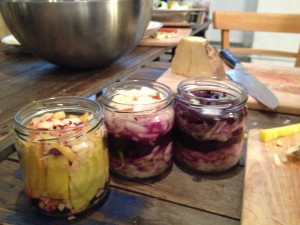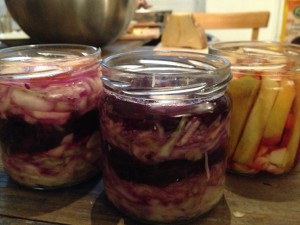Fermentation
“Fermented foods are not the secret to health and longevity. Nor is exercise, nor a curios mind, nor an open heart, nor a wholesome diet, nor inner contenment, nor sexual bliss, nor regular bowel movements, nor restful sleep. But each of these, along with innumerable other factors, influences the overall state of our well-being. And fermented foods are part of the picture.” 1
The text comes from the book “The Art of Fermentation” by Sandor Ellix Katz, who is the “guru” of fermentation worldwide. In close to 500 pages he offers a deep immersion into the historical evolution, techniques, processing procedures, advice, and aspects of fermentation in relation to health. It makes for a fully engaging and inspirational peek at the world of fermentation.
What is fermentation?
Fermentation is a natural phenomenon that we have not invented. It would be more correct to say, that fermentation has created us. 2
Fermentation is the transformation of food products under the effect of different bacteria, enzymes and fungi, often with the exclusion of oxygen.
Fermentation offers one possibility of preserving food longer. In the colder regions of our planet it was absolutely essential for survival. Fermented foods play an important role also in hot countries.
Up to 30% of all the food we eat is fermented. The Germans will naturally think of sauerkraut first. But some people will be surprised when they hear the mention of: beer, wine, tea, coffee, cocoa, cheese, olives, “miso”, bread, raw sausage and salami.
Fermentation is a process that cannot be 100% controlled (at home). Temperature, light, and different bacteria lead to different results. It’s exciting to watch for the surprising effects.
What benefit does it provide us with?
Digestion of fermented foods is easier than that of raw foods; it should be seen be as a kind of pre-cooking, so that our body can better absorb important nutrients.
A fermented carrot is, in comparison to a non-fermented carrot, a natural carrier of microbial cultures. In addition, the fermentation increases the nutritional value of foods primarily for the benefit of our digestion and our immune system.
Fermentation preserves traditions and old recipes. There are no peoples on earth who do not practice fermentation. Our ancestors intuitively knew the relationship between naturally cultured foods and health.
Fermentation leads to the increased enjoyment of food. More pleasure! It also produces new and wonderful flavours.
What happens with the bacteria?
Bacteria are absolutely vital. All life on our planet is of bacterial origin, they are our helpers. Bacteria have no fixed genes; they are highly changeable and adaptable. There is a permanent genetic exchange. Our skin, oral cavity and intestines are dotted with bacteria, from where they provide benefits. This must be so. Do not clean everything so thoroughly!
“If sterilized, processed food ist starving our microbiota of genetic stimulation, live – culture foods that are rich depositories of bacterial genes are part of our human cultural legacy, everywhere. Through dietray change, we can indulge ourselves, and eat a variety of bacteria-rich living foods, precisely in order to build such genetic reservoirs inside our intestines, to enhance our metabolic capabilities, our immune function, and many other regulatory physiological functions.” 3
How can you practice fermentation at home?
A simple way to start with fermentation is by using, for example, vegetables or lactic acid cabbage (sauerkraut). You need: a glass jar with lid, vegetables, water, and a few spices like pepper, salt or chilli peppers. The rest is done by itself. We’ll show you how it works in a video.
The important thing is: to learn the art of home fermentation. After an hour cut, massage your vegetables and fill your jars, they’ll offer an impressive collection of stimulating vegetables in your pantry. They can serve as delicious sandwich stuffers, as crunchy salad accompaniments, as a side plate to a roast chicken or as a gift for your best friend.
It’s much simpler than you imagine! Go ahead!
Fermentation brings vitality and freshness to your body.
1 Katz, Sandor Ellix: “The Art of Fermentation”, Chelsea Green Publishing, 2012, p. 22f
2 see before. p. 1
3 see before. p. 5


